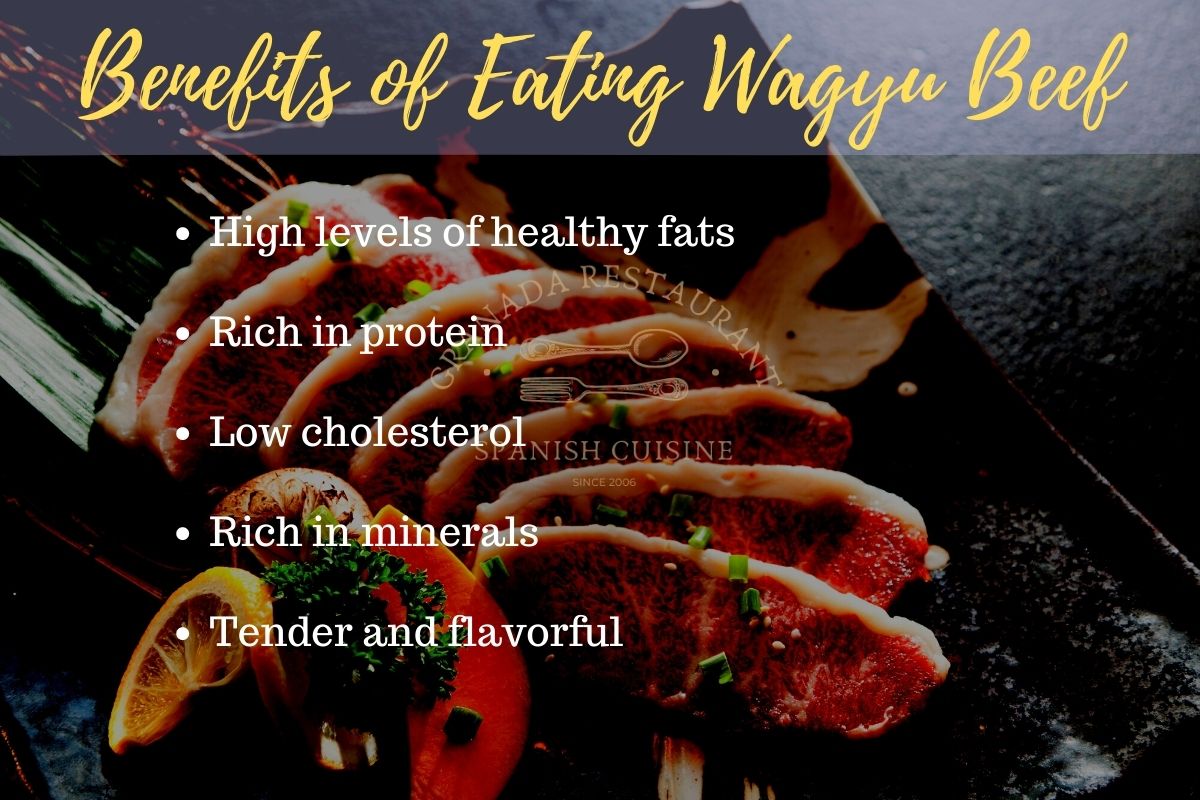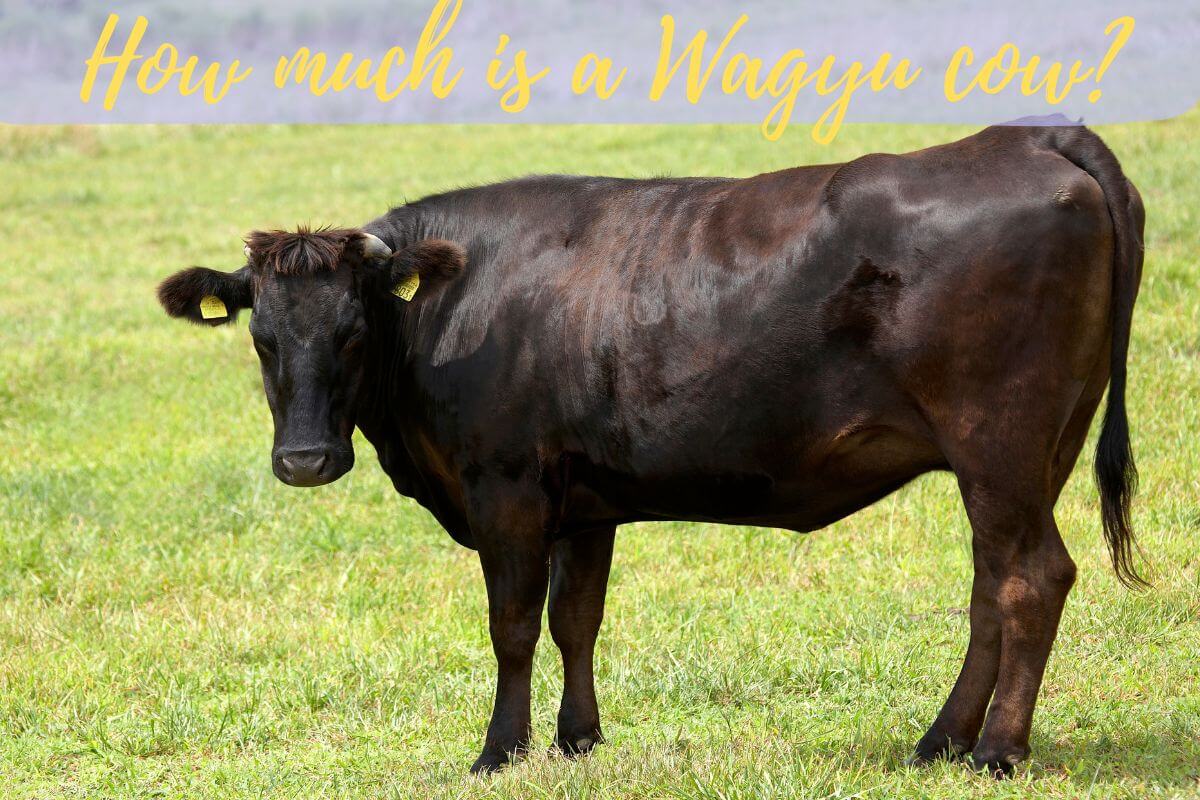How much is a Wagyu cow? For any serious food enthusiast, Wagyu cattle are undeniably fascinating. Across the world, these sought-after cows produce some of the most prized and expensive cuts of beef – something that’s earned them a global reputation for excellence among high-end and casual foodies.
But have you ever stopped to wonder exactly how much one of these cows costs at the market?
In this blog post, we’ll explore this exact question by breaking down the costs associated with raising, butchering, and selling one particular animal in order to get an estimate of just what it takes to bring a Wagyu cow from farmland to your plate.
If you’re here just to look for the quick answer:
The cost depends on several factors, including the breed, age, and how much meat it can produce. Generally, purebred Wagyu cows will cost between $2,500 and $30,000. The price can also fluctuate depending on how many are available in the market at any given time.
What Is Wagyu Beef, and Where Does It Come From?
Wagyu beef is a type of high-quality beef that comes from specific breeds of cattle originating in Japan. The name “Wagyu” literally means “Japanese cow” and refers to several breeds, including the popular Kobe beef. These cows produce a unique type of beef that is known for its intense marbling, richer flavor, and super-tender texture.
Wagyu beef is highly prized around the world, commanding prices up to ten times higher than regular beef.
The breeding, feeding, and care of the cattle are strictly controlled to ensure the quality of the meat. Some of the best Wagyu beef is produced in the Hyogo prefecture, which is home to the city of Kobe.

How Is Wagyu Beef Different than Other Types of Beef?
Wagyu beef has a much higher fat content than other types of beef. This gives it a distinctive, rich flavor and an incredibly tender texture. The marbling is also much more pronounced in Wagyu beef, making it visually appealing.
This combination of flavor and texture makes Wagyu so desirable and expensive.
Wagyu beef is a type of Japanese delicacy that continues to delight foodies around the world. The secret behind Wagyu’s unmatched flavor and tenderness lies in its genetic predisposition for higher levels of unsaturated fat and traditional cattle-raising methods such as specialized diets and sake massages. These distinctive practices are what make this particular variety of meat stand out from all others!
Wagyu beef is renowned for its high levels of beneficial monounsaturated fats, including oleic acid found in olive oil. Moreover, it’s also abundant in omega-3 and omega-6 fatty acids known to promote good health.
What Are the Benefits of Eating Wagyu Beef?
Wagyu beef has several benefits when consumed in moderation. Some of the benefits of eating Wagyu beef include:
- High levels of healthy fats: As mentioned before, Wagyu beef has high levels of monounsaturated fats, such as oleic acid, which is the same type of fat found in olive oil and is believed to have health benefits. The meat is also rich in omega-3 and omega-6 fatty acids, essential for maintaining a healthy heart.
- Rich in protein: Wagyu beef is an excellent source of protein, which is essential for building and repairing muscle tissue.
- Low cholesterol: The monounsaturated fats in Wagyu beef have been shown to lower bad cholesterol levels in the blood, reducing the risk of heart disease.
- Rich in minerals: Wagyu beef is rich in minerals such as zinc, iron, and selenium, essential for maintaining overall health.
- Tender and flavorful: Wagyu beef is known for its tenderness and rich, buttery flavor due to its high marbling.
Read More: Is Wagyu Beef Worth the Splurge? Look at The Price per Pound
It’s worth noting that high-fat meats like Wagyu beef should be consumed in moderation as part of a balanced diet. It’s also important to be mindful of the cooking method, as consuming high-fat meats cooked at high temperatures (such as grilling) can produce harmful compounds.
How Much Is a Wagyu Cow?
The cost of a Wagyu cow can vary depending on several factors, such as the quality of the animal, its age and breeding history, and the region in which it is located.
Generally, Wagyu cattle prices range from a few thousand dollars for a young animal to tens of thousands for a high-quality breeding bull or cow. It’s important to do research and compare prices from different sources to get an idea of the current market value for Wagyu cattle.
Wagyu cattle are a highly prized breed known for the high-quality marbling of their meat, resulting in tender and flavorful beef. This, along with the reputation of the breed, makes them more expensive than most other cattle breeds.
Prices for Wagyu cattle can vary greatly depending on the quality of the animal, its breeding, and the region where it’s being sold.
For example, a full blood Wagyu cow can range from around $4,000 to $20,000, while a purebred Wagyu cow can cost around $2,000 to $8,000. A high-quality breeding bull can be even more expensive, with prices ranging from $30,000 to $50,000 or more.
It is also important to note that the cost of feeding and maintaining a Wagyu cow is generally higher than that of other breeds, as they require a higher-quality diet and more specialized care.
Note that all wagyu are not created equal, and many farms will sell crossbred wagyu, which will not have the same marbling or flavor as purebred.
The Cost of Raising a Wagyu Cow
The estimated cost of raising a Wagyu cow can vary widely depending on factors such as location, the size of the operation, and the specific management practices used. However, some estimates suggest that the cost of raising a Wagyu cow can range from several thousand dollars to tens of thousands of dollars per year.
Some of the main costs associated with raising a Wagyu cow include:
- The feed can range from $1,000 to $2,000 per year, depending on the cost of ingredients in your area and the size of your operation.
- Housing can range from a few thousand dollars for a simple barn or shelter to tens of thousands for a larger, more complex structure.
- Veterinary care can range from a few hundred dollars for basic vaccinations and deworming to several thousand dollars for more advanced treatments or surgeries.
- Labor can range from a few hundred dollars for a small operation to several thousand dollars for a larger operation that requires more time and effort.
- Transportation can range from a few hundred dollars for a short distance to several thousand dollars for a longer distance.
It’s important to note that these costs can vary widely depending on the location, the size of the operation, and the specific management practices used. Additionally, it’s also worth considering the income generated from the sale of the meat and other by-products, which can offset some of the costs of raising a Wagyu cow.
How to Cook Wagyu Beef for The Best Results
Cooking Wagyu beef correctly is essential to getting the best results. Here are a few tips on how to cook Wagyu beef for the best results:
- Choose the right cut: Different cuts of beef require different cooking methods. For example, a tenderloin or ribeye will be best served with a quick, high-heat cooking method, such as grilling or pan-searing. On the other hand, a brisket or chuck roast will be best cooked with a low and slow method, such as braising or smoking.
- Bring the beef to room temperature: Take the beef out of the refrigerator for at least 30 minutes before cooking to bring it to room temperature. This will help the beef cook more evenly.
- Use the right cooking fat: Wagyu beef is high in fat, so it is important to use the right cooking fat to ensure the beef doesn’t stick or burn. Canola, grapeseed, or avocado oil are great options as they have a high smoke point and are healthy.
- Cook to the right temperature: Use a meat thermometer to ensure the beef is cooked to the correct temperature. Wagyu beef should be cooked to an internal temperature of 130-140°F for medium-rare and 140-150°F for medium.
- Let it rest: After cooking, let the beef rest for at least 5 minutes before slicing or serving. This will allow the juices to redistribute and make the beef more tender.
- Be mindful of the seasoning: Wagyu beef is already flavorful, so be mindful of the seasoning you use. Keep it simple and let the natural flavor of the beef shine.
By following these tips, you can ensure that your Wagyu beef is cooked to perfection, and you can enjoy its rich and delicious flavor.
Find out: Sustainable Eating: Why Half a Cow Might Be the Right Choice
Some Wagyu Beef Recipes
Wagyu beef is a versatile ingredient that can be used in a wide variety of dishes. Here are a few popular recipes that include Wagyu beef:
- Wagyu Beef Steak: A classic recipe that highlights the rich flavor and tenderness of Wagyu beef. Simply season the steak with salt and pepper and cook it to your desired doneness.
- Wagyu Beef Tacos: A fun and flavorful way to enjoy Wagyu beef. Season the beef with a spice rub or marinade and cook it on a grill or in a skillet. Serve it in warm corn tortillas with your favorite toppings, like salsa, guacamole, and shredded cheese.
- Wagyu Beef Sliders: A perfect party appetizer or casual dinner option. Season Wagyu beef into small patties with salt and pepper from the ground, and cook them in a skillet or on a grill. Serve them on mini buns with your favorite toppings, like cheese, lettuce, and tomato.
- Wagyu Beef Ramen: A hearty and satisfying dish that combines the rich flavor of Wagyu beef with the comforting warmth of ramen noodles. Cook the beef in a flavorful broth with vegetables and ramen noodles, and top it with a soft-boiled egg, green onions, and sesame seeds.
- Wagyu Beef Carbonara: A rich and creamy pasta dish that highlights the delicious flavor of Wagyu beef. Cook the pasta according to package instructions, then toss it in a sauce with eggs, Parmesan cheese, and bacon.
- Beef Tajine: A traditional North African dish that typically features beef, spices, and fruit stew. The combination of sweetness and savor gives the dish a fantastic taste, and the wagyu’s tenderness makes it a treat for the taste buds.
These are just a few examples of how you can enjoy Wagyu beef. With its rich flavor and tenderness, it’s a versatile ingredient that can be used in a wide variety of dishes.
Frequent Ask Questions
1. How much is a whole Wagyu cow?
The cost of a whole Wagyu cow can vary greatly based on factors such as location, breed, and quality, but prices can range from several thousand dollars to tens of thousands of dollars.
2. Can you buy a Wagyu cow?
Yes, it is possible to purchase a Wagyu cow, although it is typically more expensive than other breeds of cattle.
3. How much does a Wagyu bull cost?
The cost of a Wagyu bull can also vary based on the same factors, but prices can range from several thousand dollars to tens of thousands of dollars.
Read: Cook Like a Pro: How Many Ounces in A Pound of Ground Beef!
4. Why are Wagyu cows so expensive?
Wagyu cows are considered to be one of the most expensive breeds of cattle due to their high-quality meat, which is prized for its flavor, tenderness, and marbling. Additionally, the breeding of Wagyu cattle is carefully controlled to maintain their high quality, which adds to the cost.
5. How much does a Wagyu cow cost on average?
The average cost of a wagyu cow can range from $3,000 to $30,000 or more, depending on the breed and quality.
6. Are there different prices for male and female Wagyu cows?
Yes, the price can vary depending on the gender and age of the cow, with females typically costing more than males.
7. Does the location affect the price of a Wagyu cow?
Yes, the location can have an impact on the price, as the cost of raising wagyu cattle can vary greatly based on local conditions.
8. Can Wagyu cows be purchased at auction?
Yes, wagyu cows can be purchased at auction, and the prices at auction can be lower or higher than the average market price.
9. What factors determine the price of a wagyu cow?
The factors that determine the price of a wagyu cow include the breed, quality, age, gender, location, and supply and demand in the market.
So there you have it! Everything that you need to know about Wagyu beef. This type of beef is definitely a luxurious treat, but it is worth the splurge if you are looking for a delicious and indulgent meal. Do you have any experience cooking or eating Wagyu beef? Let me know in the comment section below.
Further Reading:
- The Japanese Wagyu beef industry: current situation… – NIH
- Making Sense of Japanese Wagyu Cow Export Rules
- How to Cook Wagyu Beef – wikiHow

I am Benjamin Nunez, and I love Spanish food, Italian food, and seafood. I have worked in kitchens all my life. I started as a dishwasher when I was just a teenager, and worked my way up to being a head chef.
I specialize in Spanish cuisine, but I can make any kind of Italian or seafood dish you want. My kitchen is always open! Website: https://granadarestaurant.com/

